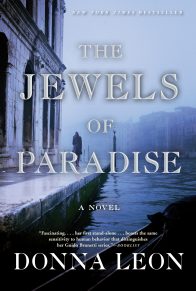About the Book
The memorable characters and Venetian drama that have long captivated Donna Leon’s many readers are on full display in The Temptation of Forgiveness. Surprised, if not dismayed, to discover from his superior, Vice-Questore Patta, that leaks are emanating from the Questura, Commissario Guido Brunetti is surprised more consequentially by the appearance of a friend of his wife’s, fearful that her son is using drugs and hopeful Brunetti can somehow intervene. When Tullio Gasparini, the woman’s husband, is found unconscious and with a serious brain injury at the foot of a bridge in Venice after midnight, Brunetti is drawn to pursue a possible connection to the boy’s behavior. But the truth, as Brunetti has experienced so often, is not straightforward.
As the twenty-seventh novel unfolds in Donna Leon’s exquisite chronicle of Venetian life in all its blissful and sordid aspects, Brunetti pursues several false and contradictory leads while growing ever more impressed by the intuition of his fellow Commissario, Claudia Griffoni, and by the endless resourcefulness and craftiness of Signorina Elettra, Patta’s secretary and gate-keeper. Exasperated by the petty bureaucracy that constantly bedevils him and threatens to expose Signorina Elettra, Brunetti is steadied by the embrace of his own family and by his passion for the classics. This predilection leads him to read Sophocles’ Antigone, and, in its light, consider the terrible consequences to which the actions of a tender heart can lead.
Praise for The Temptation of Forgiveness
Named a Best Crime Book of the Year by Marilyn Stasio for the New York Times Book Review
“The Venetian settings are enchanting and Commissario Guido Brunetti’s investigative methods are drolly amusing. But it’s the living, bleeding humanity of the characters that makes Donna Leon’s police procedurals so engaging . . . In his sensitive dealings with the victims of crime, Brunetti proves as much a psychologist and social worker as a cop . . . Tagging along after this sleuth is a wonderful way to see Venice like a native.”—Marilyn Stasio, New York Times Book Review
“[A] droll and intelligent series . . . As Brunetti makes his tactful way through a Venetian maze of office politics, family connections and moral conundrums, his focus switches from school children procuring narcotics to old people victimized by greedy and unethical medical professionals.”—Tom Nolan, Wall Street Journal
“[Commissario Guido Brunetti] is the perfect hero for Leon’s minimal, almost lyrical writing style . . . As usual in Leon’s novels, the frank depiction of the darker aspects of life in modern Venice sits right alongside some of the most enchanting descriptions of the city in contemporary fiction.”—Steve Donoghue, Christian Science Monitor
“Once again we’re in Donna Leon’s enticing, troubled and beautiful Venice with its bridges, canals, narrow lanes, tourists, fogs, pastries, wines—and crooks . . . Craftily, meticulously and ingeniously, Leon unfurls her plot . . . Leon’s prose is smooth and supple, and her latest mystery is one of her best.”—Providence Journal
“The Temptation of Forgiveness . . . presents the understated yet razor-sharp investigator with what is possibly his most complex mystery to date, arising from what appears to be a somewhat simple crime that has a particularly tragic result . . . Once again, Leon gives us that rare novel that will satisfy fans of pure mysteries while entrancing those who are interested in personalities, cultures, and the complexities of life and living. Do not miss The Temptation of Forgiveness or, for that matter, any of the books that have come before.”—Book Reporter
“Perfect beach fare . . . These Venice-based novels are sumptuous: charming, clever, atmospheric and compelling. Leon blends politics, philosophy, history and gastronomy into her mix, and ties it up with a mystery solved by the lugubrious and companionable Brunetti. Wonderful.”—Financial Times
“As in all the Commissario Brunetti novels, Venice, brooding over the human comedy, Venice watchful of the sea is always a main character . . . Leon’s mysteries are always welcome companions because they offer the intellect, as well as the heart, the food they crave.”— Reviewing the Evidence
“Donna Leon has written almost three dozen novels in this series, combining vivid descriptions of Venice, Brunetti’s appetite, and a wide variety of social ills. In this installment, she combines the taking advantage of elderly people and of government programs such as medicine and drug insurance, exposing both while Brunetti goes about in his calm manner conducting his investigation.”—Promoting Crime Fiction
“After more than twenty-five books in the series, this breaks some new ground . . . It is good to see such an established author changing and growing . . . Not only is the solution both surprising and believable, but it requires Brunetti to make a moral decision.”—Deadly Pleasures Mystery Magazine
“Dip into any of [Leon’s] 27 novels and you’ll find delightful places and faces and real cafes, restaurants and piazzas far from the mobs of San Marco. Whether it’s the charm of La Serenissima herself or Leon’s ability to turn Italy’s wild-west politics into highly personal pltos, there’s not a bad book in this long-running series, and The Temptation of Forgiveness is no exception. Our favorite people and places are here, along with some new ones, and the plot—drugs, death, corruption—leads to a satisfactory, if slightly cynical, end. In short, perfect Brunetti.”—Globe and Mail (Canada)
“Donna Leon has written almost three dozen novels in this series, combining vivid descriptions of Venice, Brunetti’s appetite, and a wide variety of social ills. In this installment, she combines the taking advantage of elderly people and of government programs such as medicine and drug insurance, exposing both while Brunetti goes about in his calm manner conducting his investigation. Recommended.”—Midwest Book Review
“As always, it’s a pleasure spending time in Brunetti’s world.”—Kirkus Reviews
“Thought-provoking . . . Amid the procedural aspects of the case, vivid descriptions of Venice, and interludes with Brunetti’s pesky superior, Leon offers intelligent reflections on the fallout that can harm both innocent and guilty in the quest for justice.”—Publishers Weekly
“[A] richly rewarding series . . . Another powerful exploration of the injustice of justice from a master of character-rich crime fiction. Guido Brunetti may be the most beloved protagonist in crime fiction, and if his shoulders are stooping over so many encounters with human tragedy, his fans will feel only excitement at the prospect of joining him in his twenty-seventh adventure.”—Bill Ott, Booklist
Praise for Donna Leon’s Commissario Guido Brunetti Mysteries:
“Donna Leon’s Venetian mysteries never disappoint, calling up the romantic sights and sounds of La Serenissima even as they acquaint us with the practical matters that concern the city’s residents.”—Marilyn Stasio, New York Times Book Review
“Few detective writers create so vivid, inclusive, and convincing a narrative as Donna Leon . . . One of the most exquisite and subtle detective series ever.”—Washington Post
“The sophisticated but still moral Brunetti, with his love of food and his loving family, proves a worthy custodian of timeless values and verities.”—Wall Street Journal
“[Leon] uses the relatively small and crime-free canvas of Venice for rips about Italian life, sexual styles and—best of all—the kind of ingrown business and political corruption that seems to lurk just below the surface.”—Chicago Tribune
“Hers is an unusually potent cocktail of atmosphere and event.”—New Yorker
“For those who know Venice, or want to, Brunetti is a well-versed escort to the nooks, crannies, moods, and idiosyncrasies of what residents call La Serenissima, the Serene One . . . Richly atmospheric, [Leon] introduces you to the Venice insiders know.”—USA Today
“Donna Leon is the undisputed crime fiction queen . . . Leon’s ability to capture the social scene and internal politics [of Venice] is first-rate.”—Baltimore Sun
“Terrific at providing, through its weary but engaging protagonist, a strong sense of the moral quandaries inherent in Italian society and culture.”—San Francisco Chronicle
“Brunetti is one of the most attractive policemen in crime fiction today.”—Philadelphia Inquirer
“As always, Brunetti is highly attuned to (and sympathetic toward) the failings of the humans around him.”—Seattle Times
“Leon’s writing trembles with true feeling.”—Minneapolis Star Tribune
“Leon started out with offhand, elegant excellence, and has simply kept it up.”—Guardian
“Compassionate yet incorruptible, Brunetti knows that true justice doesn’t always end in an arrest or a trial.”—Publishers Weekly
“[Brunetti] is a superb police detective—calm, deliberate, and insightful as he investigates with a reflective thoroughness.”—Library Journal
“The appeal of Guido Brunetti, the hero of Donna Leon’s long-running Venetian crime series, comes not from his shrewdness, though he is plenty shrewd, nor from his quick wit. It comes, instead, from his role as an Everyman . . . [his life is] not so different from our own days at the office or nights around the dinner table. Crime fiction for those willing to grapple with, rather than escape, the uncertainties of daily life.”—Booklist
“It’s difficult to describe the work of Donna Leon other than in superlatives . . . An annual blessing, a fine series—one of the finest (see what I mean) in the mystery (or any) genre . . . There are few reading joys that equal cracking the binding of a new Leon novel . . . If you have not experienced this world, so exotic and yet so familiar, you can pick up literally any volume in the series and begin a comfortable entry into Brunetti’s Venice.”—BookReporter
“One of the most popular crime series worldwide . . . While the Brunetti books, with their abundance of local color and gastronomic treats, appeal to the fans of the traditional mystery, Leon has something darker and deeper in mind.”—Life Sentence
“No author has delved into Venetian society quite like Leon, whose insider’s view shows how crime seeps throughout the city, touching all strata of society.”—Mystery Scene
Praise
A New York Times Book Review Editors’ Choice
Named a Financial Times Summer Book Pick
Named a Most Anticipated Mystery of 2018 by Deadly Pleasures Mystery Magazine
Excerpt
When they were seated, Patta began: “I’d like to speak to you frankly, Commissario.” Brunetti ignored the chance this remark gave him to ask how Patta had spoken to him in the past and, instead, nodded and put on a pleasant, interested expression. At least Patta had wasted no time with preliminaries.
“It’s about leaks,” Patta said.
“Leaks?” Brunetti asked, resisting the urge to look at the ceiling.
“From the Questura,” Patta continued.
Ah, that kind of leaks, Brunetti told himself and wondered what Patta had in mind. Nothing embarrassing had appeared in either Il Gazzettino or La Nuova di Venezia for some time, so Brunetti was without advance warning about what information might be leaking from the Questura.
“These leaks, sir: could you tell me more about them?”
“I wanted to speak to you, Brunetti, because you know people here,” Patta said, reminding Brunetti that this was still the old Patta, for whom any information about the inner workings of the Questura was to be treated as part of the Delphic Mysteries.
Brunetti waved a hand in the air, either to dismiss those hidden truths Patta believed he knew or perhaps to summon them from the vasty deep.
“They talk to you,” Patta insinuated. Hearing Patta’s suspicion relaxed Brunetti and told him that, though the subject might be new, the old, adversarial order had been restored. He tossed away his momentary warming towards Patta and returned to his native good sense.
“What is it you think they’ve been talking about Vice-Questore?”
Patta cleared his throat with a small noise. “I’ve heard rumors that some people are displeased with Lieutenant Scarpa,” Patta said, struggling, it seemed, to keep indignation from his voice. Then, more calmly, as though he considered it of lesser importance, he added, “It also seems that someone has been talking about a person brought in for questioning.”
Reading Group Guide
1. In what ways is Guido Brunetti’s boss, Vice-Questore Patta, the stereotypical government bureaucrat? In what ways does he behave against type? Is Brunetti helped or hindered in his work by Patta’s “instinct to institutional survival”? (pg. 15)
2. Laws are meant to protect the innocent, Brunetti tells Professoressa Crosera (p. 27), even though he remains convinced that laws primarily preserve existing power structures. Professoressa Crosera, who seeks police action against local drug dealers, counters that she thinks laws’ primary purpose is “to punish people.” Which of these interpretations is closest to your own? What are some examples of legislative action, or inaction, that support each view?
3. Police work relies on close cooperation with active criminals, whether anonymous informants, such as the one who phones Brunetti with a tip about the fish markets, or better-known “partners,” such as the drug dealer who owes Brunetti a favor. What is the nature of Brunetti’s relationships with such sources? How is trust in various connections developed, and how far does it go? Does Brunetti feel any ambivalence about his sources or about working in this manner?
4. “We’re lepers,” Brunetti tells his colleague, Vianello (p. 138). “Well, sort of lepers: no one wants to be seen with us or talking to us because they’ll end up having trouble.” Why are ordinary Venetians so wary of going to the police? Why does Professoressa Crosera seek out Brunetti? Does her experience ultimately disprove or confirm her initial hesitation about contacting him?
5. “Finding the guilty person would do no one any good at all,” Brunetti thinks to himself as he works to find the person behind Tullio Gasparini’s assault (p. 159). Is this a throwaway thought during a moment of frustration, or a practical assessment of the limitations of justice?
6. What kind of relationship does Zia Matilde have with her nephew, Tullio Gasparino, and with her caretaker, Signorina Beata? What kind of changes have taken place in Zia Matilde’s health, and in her behavior towards Signorina Beata?
7. What kind of reputation does Dottor Donato have among his clients and among his fellow pharmacists peers in the pharmacy industry? What does Signorina Elettra discover about his client list that surprises Brunetti?
8. “People cared if someone cheated them, not if someone cheated the state,” Brunetti concludes about his fellow Venetians (p. 205). Does Brunetti himself share this sentiment? Why or why not? What type of conditions allow such an attitude to develop and prevail?
9. In the case of Constantino Belli, as Brunetti reminds Vianello, there is “no sure proof…but we can infer the truth” (p. 215). What are the limitations of the truth in a case such as Belli’s? When the justice system fails, what recourse remains? Why does Signorina Elettra becomes involved, and why does Brunetti absolve her? Do you agree with his decision to let her actions “gradually disappear from the common memory of the Questura?” (p. 226)
10. What kind of deal has Dottor Donato arranged for his “faithful clients,” and why is Zia Matilde under the impression that it “doesn’t hurt anyone” (p. 239)? How has Zia Matilde’s attitude toward the state, and the healthcare system in particular, coupled with her reverence for her pedigreed pharmacist, primed her for this scam?
11. How do Vianello and Brunetti interpret Tullio Gasparini’s unusual employment record, and why does Griffoni disagree with their analysis? Why does Brunetti rush ahead to question Professoresa Crosera, skipping key steps in his usual process?
12. “The play asked questions and asked the reader to consider them, answer them if they dared,” Brunetti thinks as he considers his rereading of Antigone (p. 272). What questions does the play raise for Brunetti? Which ones does he consider most carefully, and which ones does he dare to answer?
13. What is the one “consciously wicked thing” that Dotoressa Ruberti admits to Brunetti? (p. 296). How does she characterize the rest of her conduct? In what ways does Brunetti sympathize with her, and what prevents him from acting on the sympathies—from being tempted into forgiveness?
















